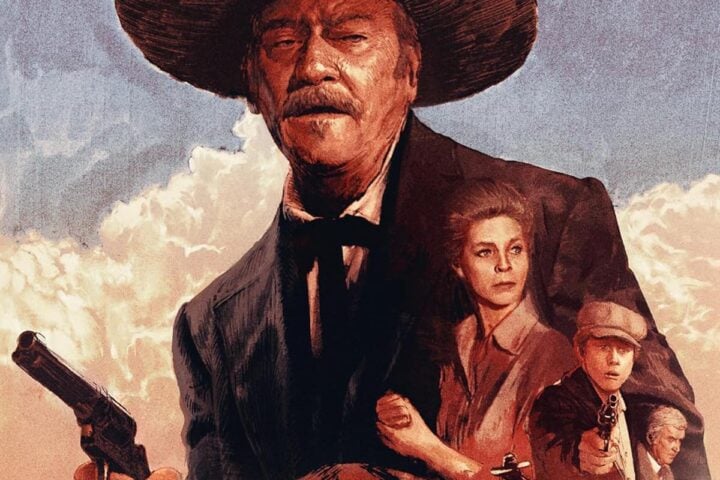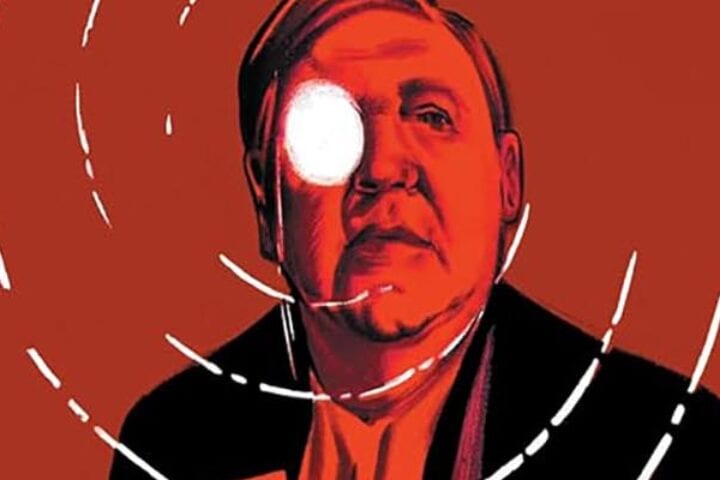Bill Karn’s Door-to-Door Maniac was originally released as Five Minutes to Live in 1961, then re-released under the new title in 1966 by American International Pictures with some added salacious content and an altered ending. Either way, what you get is a low-budget heist film that boasts a cast packed with seasoned character actors, some outlandish plot elements, and an absolutely feral performance from country music star Johnny Cash as career criminal Johnny Cabot. The zesty melodramatic script was written by actress Cay Forrester, who plays beleaguered housewife Nancy Wilson.
In true noir fashion, Door-to-Door Maniac is related in flashback. Seated in a darkened room surrounded by shadowy figures, Fred Dorella (Vic Tayback) describes how his novel idea for a bank robbery went awry. Fred’s plan involves Johnny holding Nancy hostage in her own home, forcing her husband, Ken (Donald Woods), a bank VP, to oversee Fred’s substantial cash withdrawal from the bank vault. In an amusing twist, Johnny poses as an itinerant guitar salesman, case in hand, to gain entrance to the Wilson home. This allows Cash to do some soulful strumming and even perform a couple of tunes to punctuate the otherwise breakneck proceedings.
As Fred and Johnny case the Wilson home on the morning of the heist, Cay Forrester’s screenplay succinctly juxtaposes the criminals’ prejudices about life in a small town. Fred counts on the punctuality and predictability of the residents for the success of his robbery plan, while Johnny looks around and sneers, “I never saw so much of nothing in my life.” Fred thinks the small California town of Camellia Gardens looks as idyllic as a magazine ad, but Johnny’s first glimpse of Nancy fetching the paper elicits the unflattering estimation: “She is a mess.” Fred reveals himself as something of an idealist, Johnny an inveterate nihilist. Subsequent events suggest that Johnny’s viewpoint is probably closer to the truth.
The archetypal “morning routine” sequence was shot by Karn (a frequent TV director) with all the bland frontality and flat lighting of a sitcom, an impression that’s only compounded by having Bobby Wilson played by a young Ron Howard. But the scene’s content is a far cry from early-’60s sitcom fare: Ken and Bobby feel slighted by Nancy’s zealous involvement with the local women’s club to the detriment of her wifely and motherly duties. For her part, Nancy claims that Ken’s recent promotion comes from her socializing with his boss’s wife. What’s in dispute is nothing less than a woman’s proper role both within and outside the home.
Adding another wrinkle to these tensions, we soon learn that Ken’s pesky headache is in fact a hangover deriving from a late night out with his mistress (Pamela Mason). Thus the ideal nuclear family proves itself to be anything but. The film reserves any definitive resolution of these matters until its final moments, and even then the sense of the ending definitely varies depending on which version you watch. (The original Five Minutes to Live cut is available on Wikipedia and YouTube.) Both of them, though, hinge on the significance given to a negligee.
During the hostage situation, Johnny forces Nancy to don the negligee, then attempts to rape her, before being routed by an oven alarm (in an ironic symbol of domestic disorder). In the Door-to-Door Maniac cut, a softcore sex scene has been inserted using a Johnny Cash body double that ends with a shot of a positively orgasmic Nancy. In the Five Minutes to Live cut, as they’re driving off on a second honeymoon to Vegas, Ken tells Nancy that he’s brought along the negligee as a sort of punchline. But in the Door-to-Door Maniac version, this admission brings on a bizarre montage that closes on the aforementioned moment of sexual ecstasy.
This deviation completely changes the meaning of the film’s final moments. It represents a shift from a breezy happy ending to a more complicated, disturbing, open-ended resolution. Door-to-Door Maniac suggests that Nancy will continue to be haunted by a trauma that she might just have enjoyed. This idea seems more in tune with the sexploitation “roughie” that Door-to-Door Maniac was repositioned as, rather than the relatively clear-cut crime film represented by Five Minutes to Live. One wonders what Forrester thought about the changes made to the film, or if she even ever watched the Door-to-Door Maniac version of the film. Unfortunately, none of the extras tackle this issue, so we’re merely left to speculate.
Image/Sound
Film Masters presents Door-to-Door Maniac in a new 4K restoration sourced from original 35mm elements. Despite some slight damage evident in the form of speckling and scratches, the transfer is pretty impressive overall, boasting plenty of clarity and some moody use of uncrushed shadows. The film can be watched in either widescreen or full frame formats, each providing a slightly different viewing experience. Audio comes in a sturdy Master Audio mono that cleanly delivers dialogue as well as a couple Johnny Cash tunes.
Extras
The commentary track for Door-to-Door Maniac from podcaster Daniel Budnik and film historian Rob Kelly gets a bit distractingly jokey at times, but there’s still a lot of worthwhile information on the film’s production history, cast and crew members, and release history. A major bonus here is the inclusion of a second film on its own separate Blu-ray: Aram Katcher’s Right Hand of the Devil, from 1963, also sporting a new 4K restoration viewable in widescreen and full frame formats. This is a truly bonkers heist film-cum-morality play with some striking visuals that serves as a nifty time capsule of early 1960s L.A.
Right Hand of the Devil also comes with its own bonus materials, including a commentary track from the Monster Party podcast that effectively balances a sense of humor with some well-researched information about Katcher’s one-man-band approach to filmmaking. A visual essay on the film from Someone’s Favorite Productions, written and narrated by Dr. Will Dodson, compactly and entertainingly covers Katcher’s life and career and also glosses the film with free-ranging references to everything from Milton to Nick Cave. Finally, the enclosed booklet contains essays from critic Don Stradley on the charms of Door-to-Door Maniac and critic C. Courtney Joyner on the screenwriter of Right Hand of the Devil.
Overall
Bill Karn’s Door-to-Door Maniac is a fever dream of a heist film that features a ferocious turn from country music icon Johnny Cash.
Since 2001, we've brought you uncompromising, candid takes on the world of film, music, television, video games, theater, and more. Independently owned and operated publications like Slant have been hit hard in recent years, but we’re committed to keeping our content free and accessible—meaning no paywalls or fees.
If you like what we do, please consider subscribing to our Patreon or making a donation.




